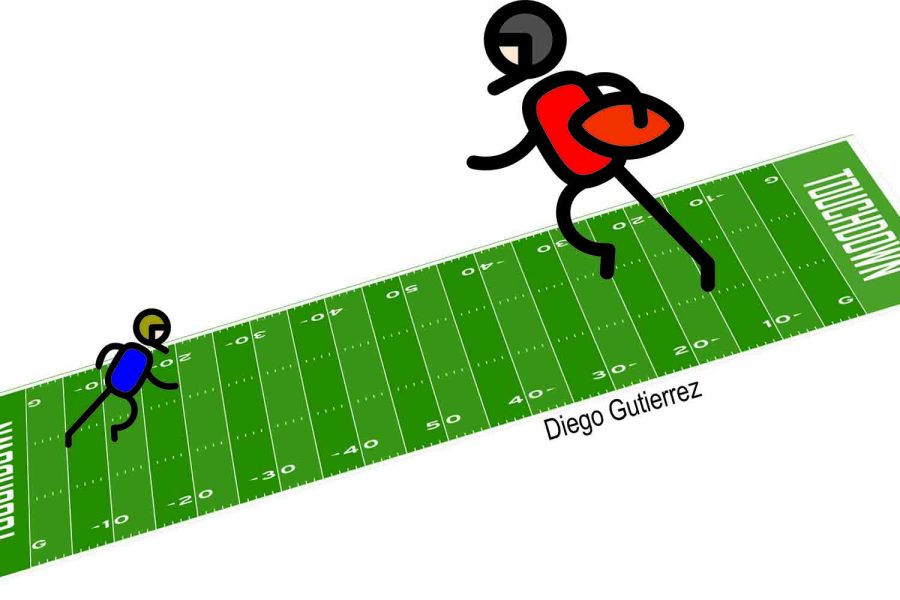Wealth disparity in schools creates major advantages
Recent reporting from the Austin American-Statesman indicates that money can have a big effect on whether teams win or lose football games.
Social-economic status has nothing to do with catching a football. But according to recent reporting from the Austin American-Statesman, money can have a big effect on whether teams win or lose football games.
Schools like Westlake, Lake Travis, and Cedar Park highs schools (all examples of schools with low student poverty rate) over the past 10 years have average winning percentages exceeding 75%. These schools and others like them across the state consistently make the players, compete for state year after year and annually send kids to the next level. Schools like Navarro, Crockett, Akins, Lehman and Northeast high school all have a student poverty rate at or above 60% and winning percentages under 30%, according to the Statesman reporting.
While no amount of money is going to make the game-winning block, pick, throw, run or kick for you, it can definitely give teams an advantage. And superior training equipment can definitely provide an unfair advantage.
At wealthy schools equipment is getting replaced every four years instead of the standard 10. Booster clubs are bringing in over $150,000 a year and some teams have a full-blown pro-level practice facility. Meanwhile, high-poverty schools have 20-year-old strength equipment and have to split time in the gym with other sports.
The way the University Interscholastic League draws districts by size and distances means that teams like Akins constantly have to play against schools like Westlake and Lake Travis that have huge advantages when it comes to wealth. It is simply not a level playing field.
Schools with higher poverty rates don’t have booster clubs bringing in exuberant amounts of money. They can’t afford the luxury of going to restaurants after games or to replace helmets and pads at the same rate as the wealthier schools, it’s not fair. The resources of the wealthier schools allow their players to eat better, condition better and practice better than the poorer schools and it’s leading to them playing better than them.
This is where “white flight” comes into play. It is a term for the mass exodus of a majority of the well o white residents of a given city from the inner cities to the surrounding areas. is creates suburbs where
they can keep their bond issue money to build massive stadiums and where they can control all the variables to build sporting powerhouses.
Obviously, nothing can be done to stop or undo the white flight that’s birthed school districts like Lake Travis and Eanes so what’s the solution? How do we remedy this? I have no idea, I wish I knew a simple fix. I wish it were as simple as moving some numbers here or putting a cap on spending there but there isn’t one.
This economic mismatch is a result of schools continuing to be woefully underfunded which isn’t going away and a by-product of systemic racism which also isn’t going away. States like Iowa, Minnesota, Colorado, Oregon, and Washington have tried to fix this by putting policies in place that redraw the divisions based on student poverty level.
While some coaches in Texas have championed the idea, the reality is that this destroys the competitive nature of the game. The players will always feel like they’re less than if they’re told by the UIL that they just can’t compete at the highest levels.
Until we adequately fund public schools in Texas, all you have to do see our broken public education system is look for those Friday night lights.
Your donation will support the student journalists of Akins High School. Your contribution will allow us to purchase equipment and cover our annual website hosting costs.

Grade: 12
Academy: Social Services
Year on Staff: 2nd
Title: Sports Editor
Why are you on staff? I joined the staff cause I needed something to do and I stayed because of the crew.
What do you do for fun? Lots of things, gaming to reading to photography to playing music or anything I fancy at the moment.
What movie do you recommend that everyone watch? I think everyone should see Jack Black's School of Rock and Bill Murray and Harold Ramis' Stripes.
Plans for after high school? Vibe
Instagram handle: @g_osa111



Neil Beyer • Oct 11, 2024 at 5:27 PM
Amen, brother.